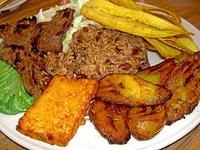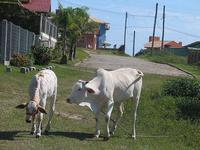Food & drink
- The first weird and wonderful fact is that Ticos (local slang for Costa Ricans) often give coffee to their babies and children!
- Great Costa Rican foods include: gallo pinto ("painted rooster"), which is rice mixed with black beans and often eggs;
Olla carne, which is beef and rice in a delicious broth with many kinds of exotic root vegetables and chorreadas, sweet corn pancakes with sour cream.

- Traditional ice creams come in interesting flavours like wild blackberry, peanut, coconut, green mango and even sour cream.
People
- It might shock you to see a lot of Costa Ricans carrying around machetes. This common purpose tool is used for absolutely everything in rural areas and it should not worry you!
- Most adult Costa Ricans under 30 use the internet, and over 50,000 Costa Ricans use the social networking site hi5.com alone.
- The National Learning Institute (INA) provides free classes to Costa Ricans in all types of job skills, and many other organizations exist (e.g. IMAS or INS) to offer social welfare to poorer people. Somehow the country manages to provide these services while still maintaining taxes at a much lower rate than in the US!
Language
Younger males often pepper their speech with the word " mae," which is derived from a word for "stupid" or "dumb." In everyday speech it is used as equivalent to "dude" or "mate". A typical statement might be, "Mae, mira que estos maes están jodiendo, mae." Literally, "Dude, look how these guys are bothering people, dude."
The government hopes to make English a "national second language," as in European countries. Over 100,000 Costa Ricans already work in jobs, such as in hotels or tech support call centres, where English is the main language.
There is in fact a whole region of Costa Rica, the Atlantic province Limón, where English is a common language. This is thanks to the Jamaican ancestors of many Limonenses who settled there to work on the railroad and banana plantations. There are also large numbers of Nicaraguan immigrants and smaller populations of Colombians, Dominicans and others.
Getting around

- Nearly all Catholic churches in the country face west. This can be very handy as directions are usually given using compass directions, for example: "100 metres east of the university."
- Every town has its own plaza, or little park, in front of a Catholic church. Bigger cities have many such parks, and in most towns a soccer field is close by.
- There are usually no street names in Costa Rica so people get used to giving directions in relation to landmarks. In rural areas people will describe their official, legal address in ways such as "pink house just north of the big tree," or even "200 metres south of where the cow is tied up."
Trivia
- At 7am every morning, all Costa Rican radio stations play the national anthem. Many also play it again at night.
- The preferred music of older Costa Ricans is Cumbia. Younger Costa Ricans often favor Reggaetón dance tunes, although there are a great variety of tastes represented.
- Costa Ricans have a fondness for 80s action movies. Films starring Chuck Norris or Jean-Claude Van Damme get frequent showing on local TV.
- On Costa Rica's various patriotic days, young schoolboys dress up with traditional hats, shirts, red scarves and painted on moustaches. Girls sport traditional braids and coloured skirts. Oxen are also featured prominently.
- Costa Rica ranks at the top of lists for the world's best surfing, sports-fishing, dive spots and great mountain hiking. Costa Rica is considered the top spot for expat retirement, but the relocation process can be confusing.
By Paul Marin
Monte Alto Real Estate Company:www.montealtorealestate.com
At Monte Alto Real Estate we do all the paperwork, all you need to do is choose your favourite property. Our new residential project offers premium properties at below market prices.

